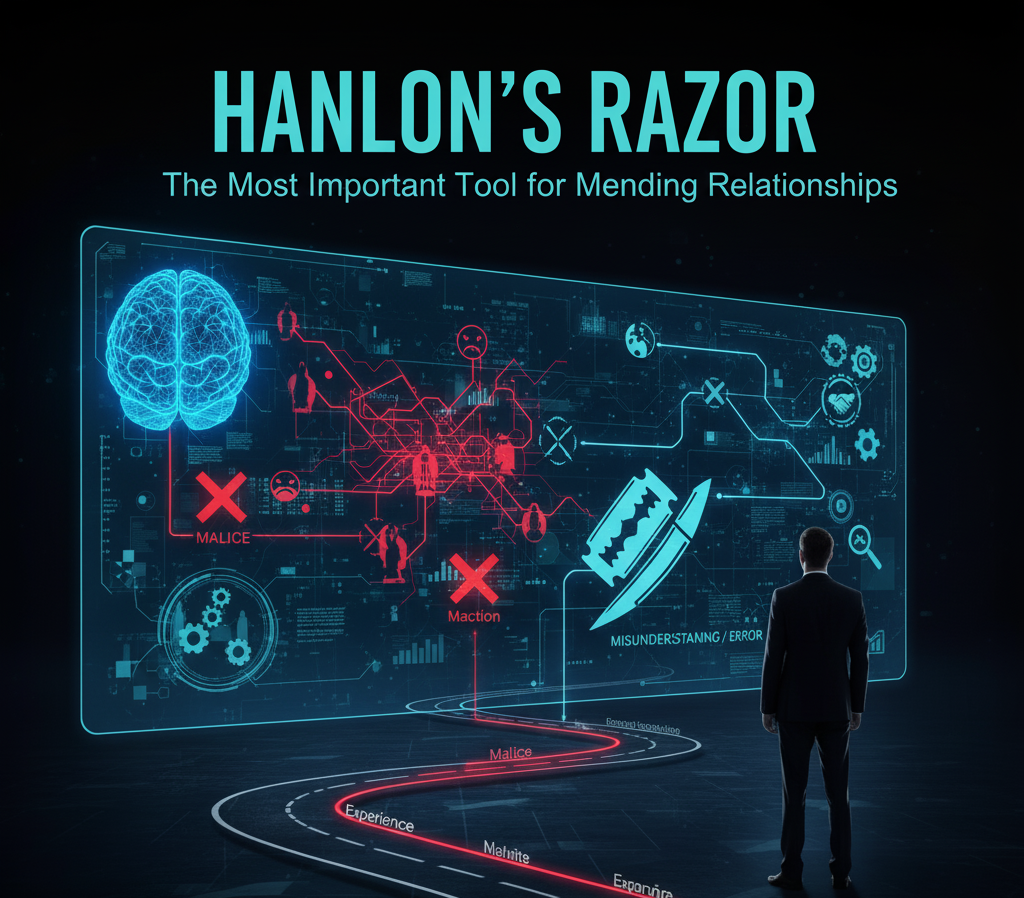
Explanation:
Hanlon’s Razor is a mental model that advises you to never attribute to malice that which is adequately explained by stupidity, incompetence, or misunderstanding.
Example:
When a colleague misses a critical deadline and makes your project late, Hanlon’s Razor suggests they likely forgot or were overloaded, not that they were intentionally trying to sabotage you.
Insight:
The most crucial insight is that this model acts as a powerful default setting that replaces suspicion with compassion, dramatically improving communication and preserving professional relationships.
The Most Important Tool for Mending Relationships
As leaders, we have seen more teams, projects, and careers destroyed by one simple human flaw than any other: our tendency to assume the worst about people.
We send a critical email, and the person doesn’t reply for 24 hours. Our immediate thought is, “They are ignoring me. They don’t respect my work.” A teammate presents data that contains a major flaw. Our brain whispers, “They are trying to make my department look bad.”
This is our default setting: jumping to conclusions of malice. We assume the other person is a villain, and we are the victim. This is where Hanlon’s Razor becomes the most valuable tool in your leadership toolkit.
Hanlon’s Razor is a simple, powerful heuristic that provides a different default. It states: Never attribute to malice that which is adequately explained by stupidity.
We can even rephrase it for the modern workplace:
“Never attribute to malice that which can be adequately explained by incompetence, misunderstanding, lack of information, or simple oversight.”
When you apply this razor, the entire world changes.
- That colleague who didn’t reply? Hanlon’s Razor suggests their inbox is a dumpster fire, or they’re overwhelmed with a personal issue. The problem isn’t malice; it’s chaos.
- The teammate with the flawed data? Hanlon’s Razor suggests they were rushed, didn’t understand the request, or simply made a mistake. The problem isn’t sabotage; it’s a systems failure.
By assuming incompetence or error instead of malice, you change your entire approach.
Instead of sending an angry, accusatory email (“Why are you ignoring me?”), you send a helpful, curious one (“Just checking if you saw my email below?”). Instead of accusing your teammate (“Your data is wrong and it’s a huge problem”), you ask a question (“I’m seeing a different number on my end. Can we walk through the data together?”).
This one shift does three magical things:
- It preserves your emotional energy. You stop living in a self-created world of villains and conspiracies. You’ll be happier, less stressed, and less paranoid.
- It makes you a better problem-solver. If you assume malice, the only solution is to fight. If you assume incompetence or error, the solution is to help. You can fix a broken process, provide better training, or clarify communication.
- It protects your relationships. And here’s the kicker: 90% of the time, your assumption of incompetence or error will be correct. And in the rare 10% of cases where the person was actually being malicious, your calm, helpful approach will expose them far more effectively than any angry outburst ever could.
Hanlon’s Razor isn’t about being naive. It’s about being smart. It’s a strategic choice to be compassionate, to be a problem-solver instead of a victim, and to save your energy for the real fires, not the imaginary ones.
